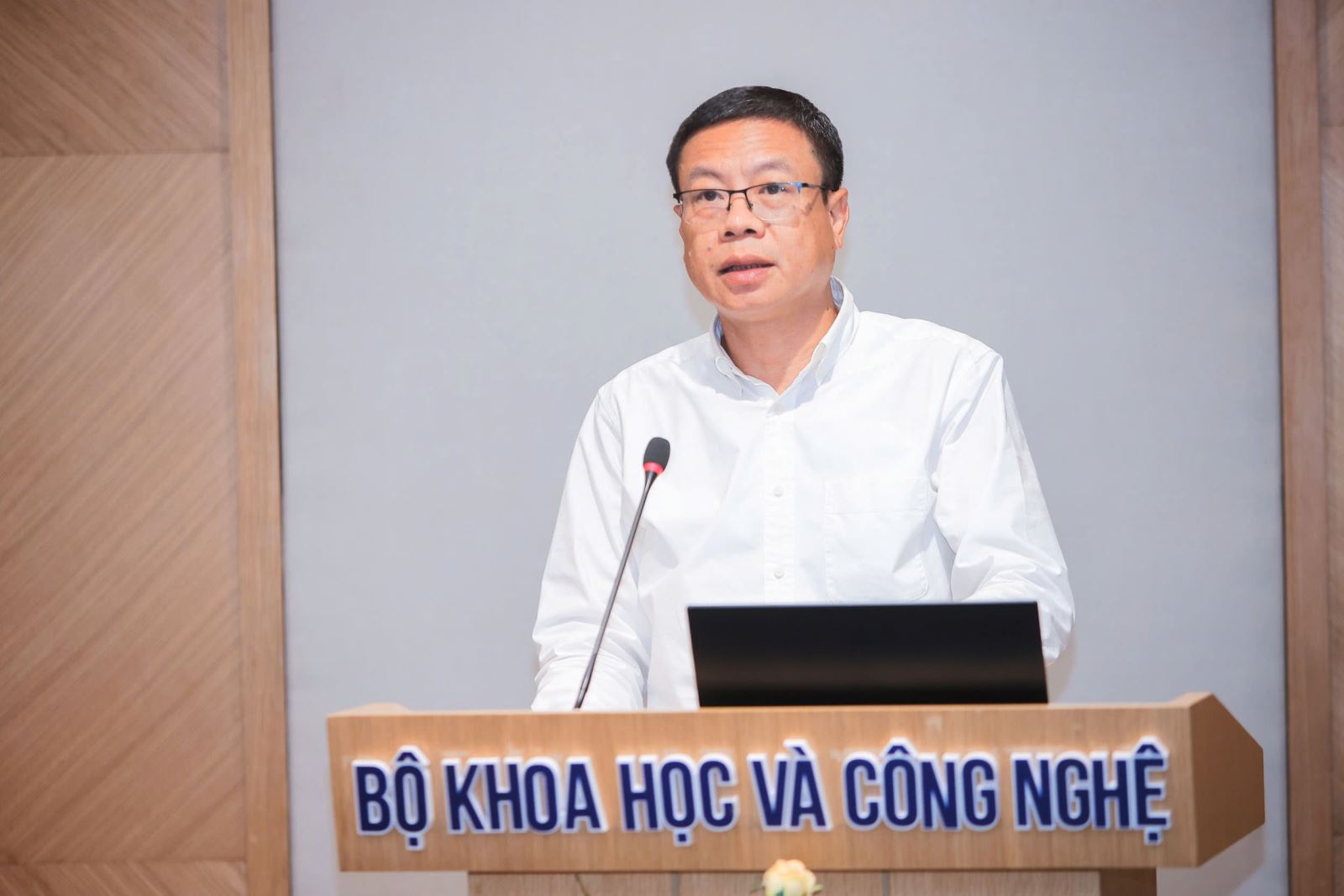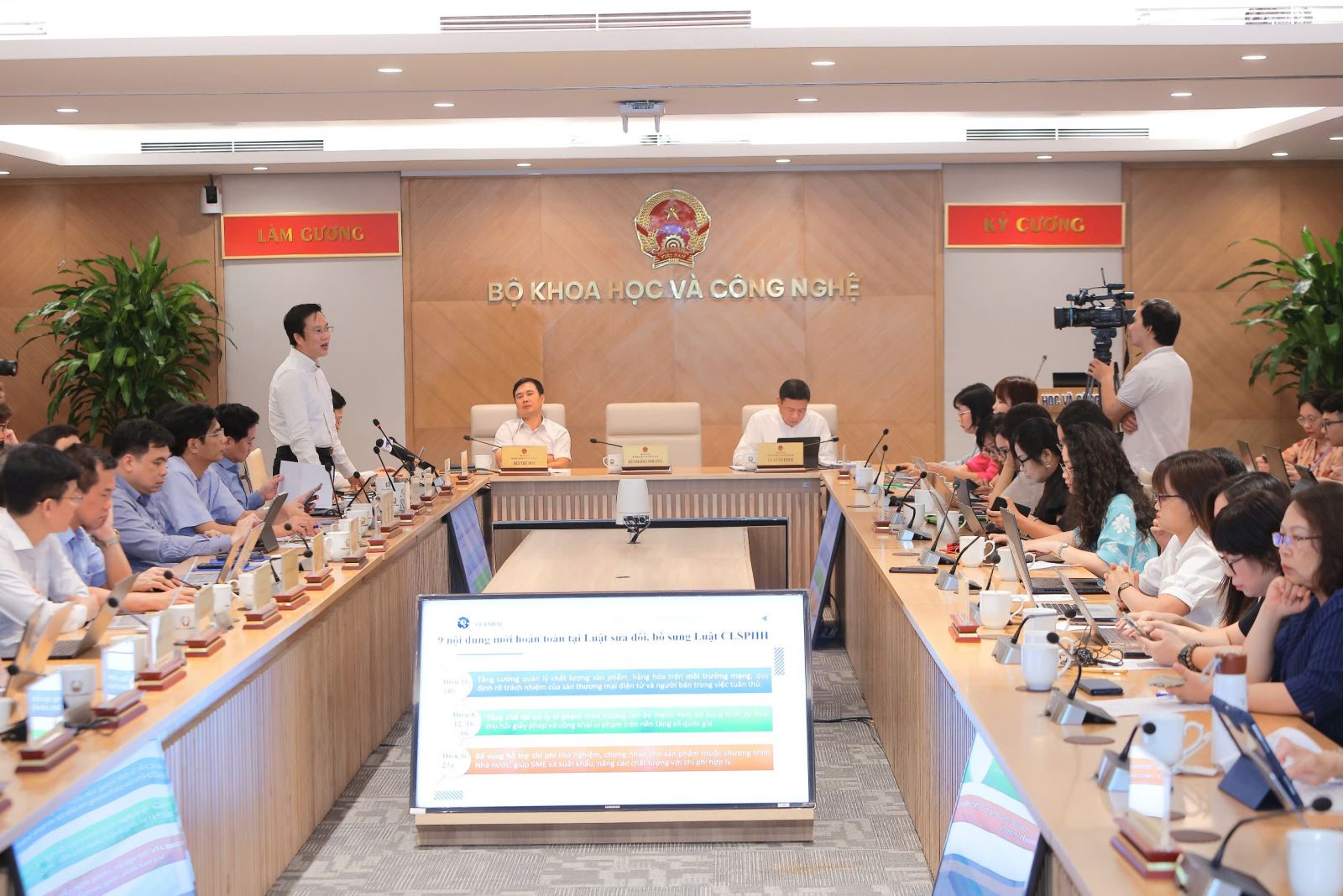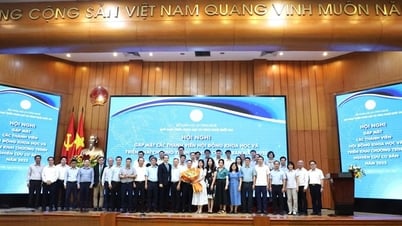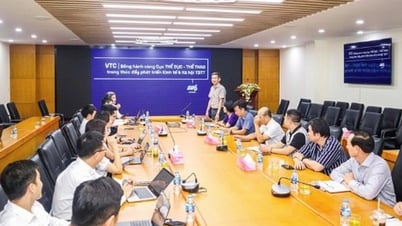On the afternoon of July 7 in Hanoi, the Ministry of Science and Technology held a press conference to introduce the basic contents of 5 Laws drafted by the Ministry of Science and Technology, which were recently passed by the 15th National Assembly at the 9th Session, including: Law on Science, Technology and Innovation; Law on Digital Technology Industry; Law on amending and supplementing a number of articles of the Law on Product and Goods Quality; Law on amending and supplementing a number of articles of the Law on Technical Standards and Regulations; Law on amending and supplementing a number of articles of the Law on Atomic Energy.

These are fundamental laws, creating an important legal corridor for the development of science, technology, innovation and digital transformation in the new period, contributing significantly to the completion of the Party's strategic goal of turning the country into a high-income country by 2045.
Deputy Minister Le Xuan Dinh stated: "In order to realize the Party's goals in the Resolution of the 13th National Congress, turning Vietnam into a developed, high-income country by 2045, in a very short time, the Politburo has issued a series of Resolutions on the country's socio-economic development, clearly identifying: Science and technology (S&T), innovation (I&T), digital transformation (DCT) are key factors, the main driving force for the sustainable development of a country. S&T is considered the foundation, I&T is the driving force and DCT is the breakthrough, all together creating a combined strength to promote economic growth, enhance competitiveness and improve the quality of life".
To quickly put the Resolution into practice, the National Assembly and the Government have issued specific action programs focusing on many areas, including digital transformation, innovation, and improving science and technology capacity.
The Deputy Minister said that, implementing the Party's direction and the Government's assignment, just 4 months after the merger of the Ministry of Science and Technology and the Ministry of Information and Communications, the Ministry of Science and Technology has completed submitting to the National Assembly for approval 5 fundamental laws, creating an important legal corridor to lead the development of science and technology, innovation and digital transformation in the new period of the country.

The Law on Science, Technology and Innovation (effective from October 1, 2025) represents a fundamental change in development thinking, for the first time including innovation in law and placing it on par with science and technology (S&T). S&T is identified as a key driving force to enhance national competitiveness, promote socio-economic development, ensure national defense and security and improve people's quality of life. S&T is expected to contribute 3% to GDP growth, while S&T only contributes 1%.
The law also shifts the management focus from input control to result management, evaluating output efficiency, allowing organizations and individuals performing research tasks to own research results for commercialization, and to enjoy at least 30% of the income from commercialization of research results. These regulations create motivation for innovation, the spirit of daring to think and dare to do in research, research towards practical results, closely linking science and technology with socio-economic development.
The Law amending and supplementing a number of articles of the Law on Product and Goods Quality (effective from January 1, 2026) demonstrates a new management mindset, shifting from an administrative management model to risk-based quality management; from pre-inspection to post-inspection based on data and digital technology; from an incentive mechanism to binding responsibilities, transparency and strict sanctions. For the first time, the Law requires the establishment of a national product and goods quality monitoring system, connecting inter-sectoral data, supporting post-inspection and handling quality risks. At the same time, it clearly regulates the management of goods traded on digital platforms, enhancing the responsibility of sellers and intermediary platforms in ensuring quality and handling consumer feedback.
The Law amending and supplementing a number of articles of the Law on Standards and Technical Regulations (effective from January 1, 2026) marks a comprehensive innovation in the thinking and management methods of the field of standards, measurement and quality. For the first time, the National Standards Strategy is legalized as a long-term orientation tool; at the same time, a National Database on standards, measurement and quality is established. The Law also stipulates the principle of "one product - one standard" nationwide, ending overlapping management and increasing enforcement efficiency. In particular, the mechanism for unilateral recognition of international assessment results will help high-tech enterprises quickly access the market.
The Law on Digital Technology Industry (effective from January 1, 2026) is a major turning point in establishing a legal framework for new fields such as semiconductor industry, artificial intelligence and digital assets. The Law on Digital Technology Industry (CCNNS) stipulates the strategy for developing specialized chips and linking global supply chains. For AI, the law sets out the principle of "taking people as the center", requiring AI digital technology products to have identification marks, and the State provides the highest preferential policies to promote research, development, deployment and use of artificial intelligence. This is also the first time that digital assets including virtual assets and encrypted assets have guaranteed ownership, transactions and security. Essential digital infrastructure such as AI data centers, concentrated digital technology zones, and national laboratories are prioritized for investment, creating a foundation for the strong development of digital transformation and Vietnam's digital economy.
The revised Law on Atomic Energy (effective from January 1, 2026) creates a comprehensive legal framework, in line with the guidelines of the International Atomic Energy Agency (IAEA). The law identifies nuclear power as a national strategy, contributing to ensuring energy security and reducing carbon emissions. An important new point is that nuclear safety and security management is unified by a competent state agency, according to international standards and manages the entire plant life cycle. The law also has a separate chapter on nuclear facility safety and promoting the application of nuclear power in medicine, agriculture, and industry, aiming to master technology and comprehensive digital transformation in this field.
The laws not only create a legal foundation for effectively implementing national policies and strategies on science and technology, innovation and digital transformation, but also play an important role in ensuring unity and synchronization in state management, especially when the two-level government system is entering the stage of actual operation.
"The participation of the entire political system, the support of the business community, scientists and the active participation of press agencies in strongly disseminating the core contents of the five laws will be a practical contribution, bringing legal policies into life, contributing to creating substantial changes, building an advanced science and technology, comprehensive innovation and effective digital transformation", Deputy Minister Le Xuan Dinh expressed his hope.
Source: https://doanhnghiepvn.vn/cong-nghe/5-luat-thao-go-nhung-diem-nghen-phat-trien-khoa-hoc-cong-nghe/20250708082517429


































































































Comment (0)